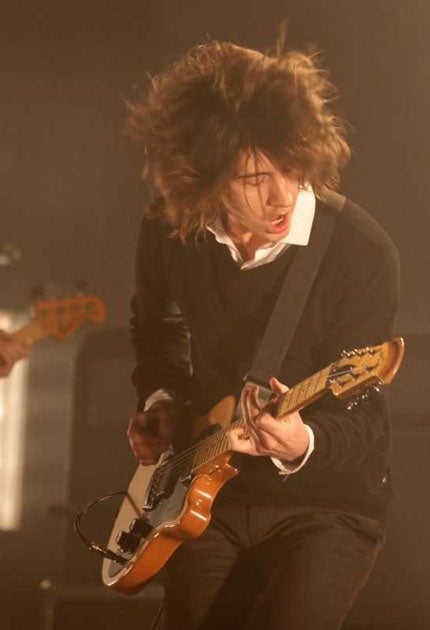Arctic Monkeys, Royal Albert Hall, London
Lightning strikes and Sheffield steel

Your support helps us to tell the story
From reproductive rights to climate change to Big Tech, The Independent is on the ground when the story is developing. Whether it's investigating the financials of Elon Musk's pro-Trump PAC or producing our latest documentary, 'The A Word', which shines a light on the American women fighting for reproductive rights, we know how important it is to parse out the facts from the messaging.
At such a critical moment in US history, we need reporters on the ground. Your donation allows us to keep sending journalists to speak to both sides of the story.
The Independent is trusted by Americans across the entire political spectrum. And unlike many other quality news outlets, we choose not to lock Americans out of our reporting and analysis with paywalls. We believe quality journalism should be available to everyone, paid for by those who can afford it.
Your support makes all the difference.Months since the collapse of the cottage industry the music business built around manufacturing bands to sound like Alex Turner's Arctic Monkeys, the originals are playing on and sounding stronger than ever. Their imitators, who found copying the style of their first and second albums tough, have found the idea of replicating their latest LP, the darker and more challenging Humbug, inconceivable.
This new, moodier Arctic Monkeys couldn't be better suited to the crashing reverb unavoidable at the Royal Albert Hall, a venue built to amplify the squeaks and trills of violins and other orchestral instruments less aggressive than the Sheffield four-piece's snarling guitars. It is Josh Homme, Queens of the Stone Age frontman-cum-producer, who can be thanked for the trick; with the high priest of stoner rock onboard and co-producing their most recent record, their tales of trawling the pubs and estates of northern England have been recast in the sprawling hallucinogenic style of Homme's desert sessions, creating a live sound gloomier and more foreboding than the sum of its constituent parts.
At no point is this more obvious than as the band catapult through "Crying Lightning", as a moshpit, that little hurricane of teenage enthusiasm, breaks out in the centre of the assembled audience. Meanwhile, in the seating sections, fans of all ages do their best to dance in the constricting space around the venue's swivelling seats. By the time the band begin "I Bet You Look Good on the Dancefloor", the Royal Albert Hall has becomes its own impromptu discotheque. "This is a song that's been good to me and the boys," announces Turner, introducing the 2005 hit, "and it's one I like to introduce by shouting ... ladies!" There is nothing surprising about the way the Monkeys marshal their great weight of material into a set that, though 19 songs long, never feels tired nor strains to hold your attention.
The enthusiasm is continued through to "When the Sun Goes Down", in which Turner's solo intro is followed by an outburst of cheering so loud that it feels like minutes before it dies down sufficiently for the band to begin the song proper. Turner, though beckoning the volume higher with a raised hand throughout, somehow manages to avoid looking arrogant, an achievement in itself.
As an encore, on "Fluorescent Adolescent" we're treated to a repeat of the trick shown off earlier on "This House Is a Circus", with the song stripped to its bare bones and reassembled at half-speed, laying bare the dynamics that earned the band Homme's description as "tight little springy fuckers". Approaching the finale, the rest of the group look on ecstatic as their frontman, Lowry-thin and sporting a mop of brown hair that is the only visual reminder of how far the group have come since they burst onto the scene five years ago, leads them in to the closing number, "505".
But, as the sound of whistling echoes down the tunnel leading from the Royal Albert Hall to the nearest tube station minutes after the Arctic Monkeys' set finishes, a straw poll of the tunes drifting through the air suggest it is "Brianstorm" which made the biggest impression on tonight's audience. From the venue's cavernous rafters, which swallowed the band's spiky guitar pop whole and spat back something altogether more expansive, to the shadows of the Pixies and Morrissey which were cast long over the night's performance, it's been an evening of echoes. The only question left is the one on the lips of many as the stunned populace file away from the hall's Victorian splendour – where will they go next?
Join our commenting forum
Join thought-provoking conversations, follow other Independent readers and see their replies
Comments